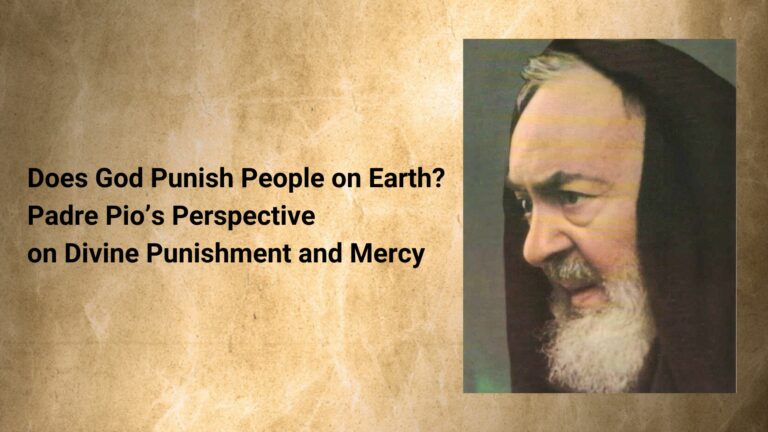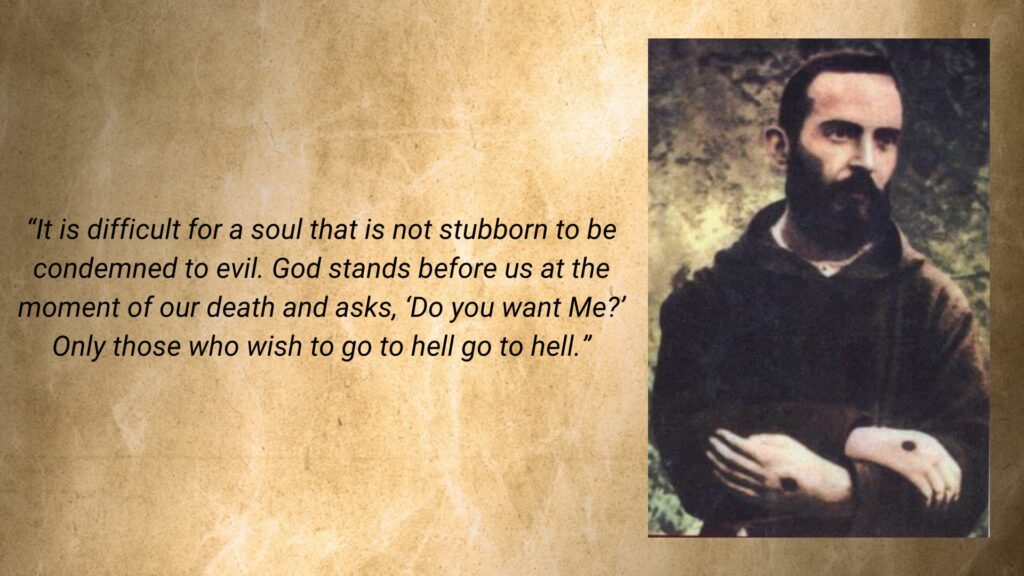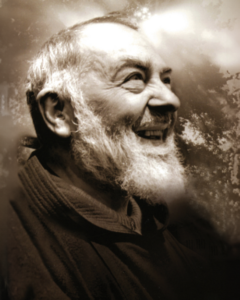
The question of whether God punishes us on earth has intrigued Christian believers for centuries. Is it possible that the hardships and suffering we face in life are direct punishments from God? Or is divine punishment reserved solely for the afterlife? In this post, we’ll explore Padre Pio’s teachings and responses to these profound inquiries, drawing from his spiritual guidance and life examples.
Padre Pio’s View on Sin, Divine Justice, and Punishment
Padre Pio, a revered figure in the Catholic Church, was deeply opposed to sin and often spoke vehemently against the dangers of sin. He warned those who strayed from the path of righteousness, emphasizing the consequences of unrepentant sin. However, his approach was not one of condemnation but of compassion and mercy. Padre Pio understood the frailty of human nature and consistently encouraged penitents to trust in the boundless goodness of the Heavenly Father.
Because God is perfection itself, He embodies all virtues to their fullest extent. This includes being both perfectly just and perfectly merciful. As the ultimate judge, God is prepared to punish unrepentant sinners, just as He did with the cities of Sodom and Gomorrah, which were destroyed due to their grave sins. Yet, this same perfect God is also the Merciful Father, eager to forgive anyone who sincerely seeks repentance, as illustrated in the story of Nineveh, where the people repented and fasted to implore God’s forgiveness.
This duality of God’s nature is also evident in the life and actions of Jesus Christ, the Second Person of the Holy Trinity. When it was necessary to assert His Father’s honor, Jesus did so with unflinching justice, as seen when He expelled the money changers from the temple. Yet, He also exemplified supreme mercy, tirelessly working to bring sinners back to God. The story of St. Mary Magdalene, who was forgiven and transformed through her encounter with Jesus, is a powerful testament to this.
A Lesson in Mercy from Padre Pio
One day, a woman named Guci quarreled with another woman in front of the altar of Our Lady of Grace. Overcome with guilt, she sought confession with Padre Pio, deeply reproaching herself for her actions. In his characteristic manner, Padre Pio initially responded with a jest, saying, “Come here so that I can beat you.” When Guci agreed, expecting to be chastised, he was taken aback by her reaction. His tone then softened, and he offered her wise counsel: “Never say to God, ‘I have sinned and therefore I deserve your punishment.’ Instead, say, ‘Lord, I have sinned. Give me Your grace and mercy.’ We must fear God’s justice, but always with a deep confidence in His mercy.”
This episode reflects Padre Pio’s profound understanding of God’s nature. While acknowledging the seriousness of sin, he emphasized the importance of seeking God’s mercy rather than living in fear of divine retribution. This approach encourages believers to trust in God’s infinite love and forgiveness.
God’s Tenderness: A Padre Pio Reflection
A spiritual son once recounted a conversation with Padre Pio about God’s tenderness towards His creatures. Padre Pio explained, “As a loving father, God gives us everything when we turn to Him with trust and confidence. Even when we offend Him through sin, He forgives us if we seek forgiveness with true repentance.” He went on to make a striking point: even Judas Iscariot, who betrayed Jesus, and the rebellious angels who defied God, could have been forgiven if they had repented.
This teaching highlights the boundless nature of God’s mercy. No sin is too great to be forgiven if the sinner approaches God with a contrite heart. Padre Pio’s message is clear: God’s love and mercy are always available, even to those who feel most unworthy.
Misconceptions About Divine Punishment
At times, people mistakenly interpret tragic events as divine punishment. For instance, when a worker from San Giovanni, who had blasphemed, fell from a scaffold and died, many in the community claimed it was God’s punishment. However, Padre Pio disagreed, emphasizing that punishment and rewards for our deeds come only in eternity.
He believed that while God allows certain events to happen, these are not necessarily punishments. Instead, they are opportunities for growth, reflection, and deepening one’s faith. Padre Pio’s perspective encourages believers to see suffering and hardship not as signs of divine wrath but as part of the mysterious plan of God, who desires the ultimate good for every soul.
The Moment of Death and God’s Final Mercy

The concern for the eternal fate of loved ones is a common worry among the faithful. One of Padre Pio’s spiritual daughters experienced this when her brother died after falling from a grain silo. Troubled about the state of his soul, she sought Padre Pio’s comfort. In response, he reassured her, saying, “It is difficult for a soul that is not stubborn to be condemned to evil. God stands before us at the moment of our death and asks, ‘Do you want Me?’ Only those who wish to go to hell go to hell.”
Padre Pio’s words offer profound hope. They suggest that at the moment of death, God gives each soul a final opportunity to choose Him, reinforcing the idea that God’s desire is for all to be saved. This view aligns with the broader Christian understanding of God as a loving Father who tirelessly seeks the salvation of every soul.
God’s Righteousness and Mercy: Padre Pio’s Teachings
Padre Pio often spoke about the delicate balance between God’s righteousness and mercy. He explained that while on earth, we experience God’s mercy more than His justice. According to Padre Pio, painful experiences and sufferings are not expressions of divine punishment but rather opportunities to participate in the love and mercy of God. True justice, he believed, is reserved for the afterlife, where each soul will receive its due reward or punishment based on its earthly life.
This understanding calls believers to live a life of repentance and humility, not out of fear of earthly punishment but out of love and a desire to be united with God in eternity.
Trust in God’s Providence
Father Cantonish shared a story about a blind man who helped around the monastery. The man expressed concern about his future after Padre Pio’s death, fearing that he would be left without support. Padre Pio, in his usual reassuring manner, told him, “The God who helped us yesterday will help us today and tomorrow. We must surrender to Him and trust in His love.”
This anecdote underscores the importance of trusting in God’s providence. Padre Pio’s faith was unwavering, and he encouraged others to cultivate the same trust. In his view, God’s care for His children is constant and unchanging, and believers are called to surrender their worries and fears to Him.
Humility and Prayer: Padre Pio’s Spiritual Advice
For Padre Pio, prayer was the lifeline that connected the soul to God. He believed that through sincere, humble prayer, believers could access the infinite mercy and love of God. He reminded his followers that God is not just a judge but a loving Father, always ready to embrace those who turn to Him with humility and trust.
Conclusion: Padre Pio on Divine Punishment and Mercy
Padre Pio’s teachings offer a powerful reminder of God’s infinite mercy and the importance of seeking forgiveness with true repentance. He firmly believed that divine punishment is not something we experience on earth but is reserved for eternity. Instead, what we encounter in this life are the loving, albeit sometimes painful, invitations from God to draw closer to Him. Through humility, prayer, and a deep trust in God’s providence, believers can navigate the challenges of life with confidence in the boundless love and mercy of the Heavenly Father.

